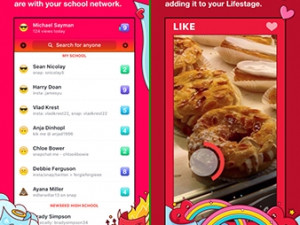
Facebook has released Lifestage, a standalone app aimed at school children that borrows some of rival SnapChat's key features.
When signing up, users need to create a video profile by filming themselves answering questions, such as what they like and dislike, and who their best friend is.
This visual profile is available to any other user within their school and nearby schools.
Schools remain 'locked' until there are at least 20 users, but people aged 21 or younger can start prepping their profiles until there are enough users in their school community.
The app's description says the aim is that users "can get to know people better in [their] school and nearby schools, discover others who are into the same stuff [they] are, and connect with them".
Every time a person in a specific school updates their profile, all the other learners who have Lifestage installed and are connected to the school will be able to view the video.
The app was developed by a teenager who works at Facebook. Michael Sayman (19) taught himself to code six years ago with tutorials he found on the Internet. He caught the attention of Facebook CEO Mark Zuckerberg for an app he created called 4Snaps.
"What if I figured out a way to take Facebook from 2004 and bring it to 2016? What if every field in your profile was a full video?" Sayman said in an interview with TechCrunch about how he created Lifestage.
Early Facebook, in 2004, did not feature a newsfeed and was meant for university students to find out more about other university students.
Lifestage is not a messaging app, and the only way to contact another user is by clicking through to whatever other social network they have decided to link to in their 'reach me' section.
SnapChat Stories are like Lifestage video bios, but are not as publically assessable.
People older than 21 can download Lifestage, but should not be able to see anyone else's profile.
However, the app does have a disclaimer in its description: "Please note: Everything you post in Lifestage is always public and viewable by everyone, inside and outside your school. There is no way to limit the audience of your videos."
It goes on to warn: "We can't confirm that people who claim to go to a certain school actually go to that school. All videos you upload to your profile are fully public content."
The app does let users block and report other users.
This is not the first time Facebook has tried to incorporate features from SnapChat into its portfolio, after failing to acquire the company for $3 billion in 2013.
Earlier this month, Facebook's picture-sharing app introduced a new feature called Instagram Stories, which allow users to post pictures and videos that disappear after 24 hours.
The feature is only differentiated from Snapchat's version by allowing users to hide their whole stories from certain followers.
There have been various other attempts, by Facebook, to try and gain popularity with SnapChat's large user base of 13- to 24-year-olds.
Lifestage is only available for download from the Apple App Store at the moment.
Share